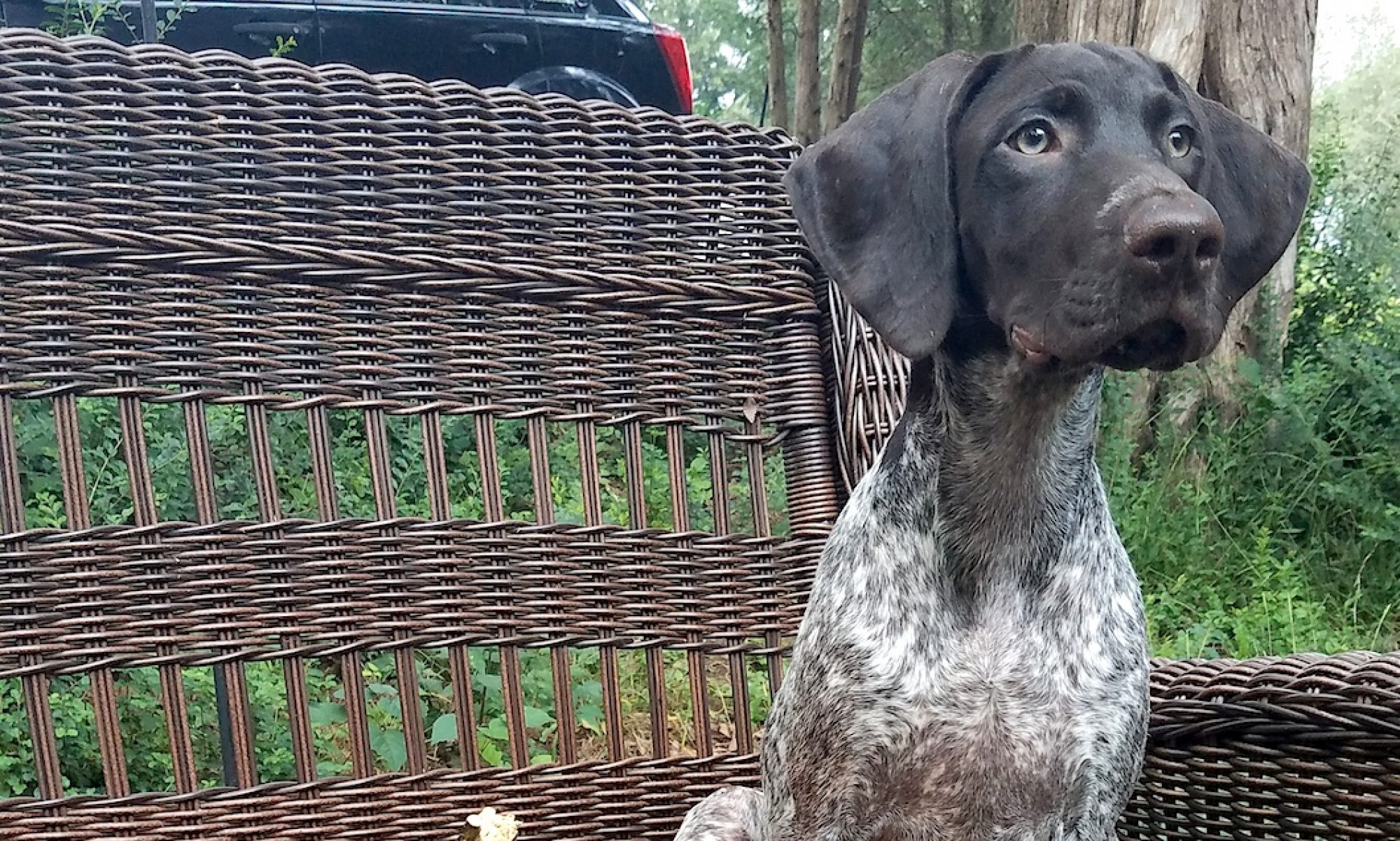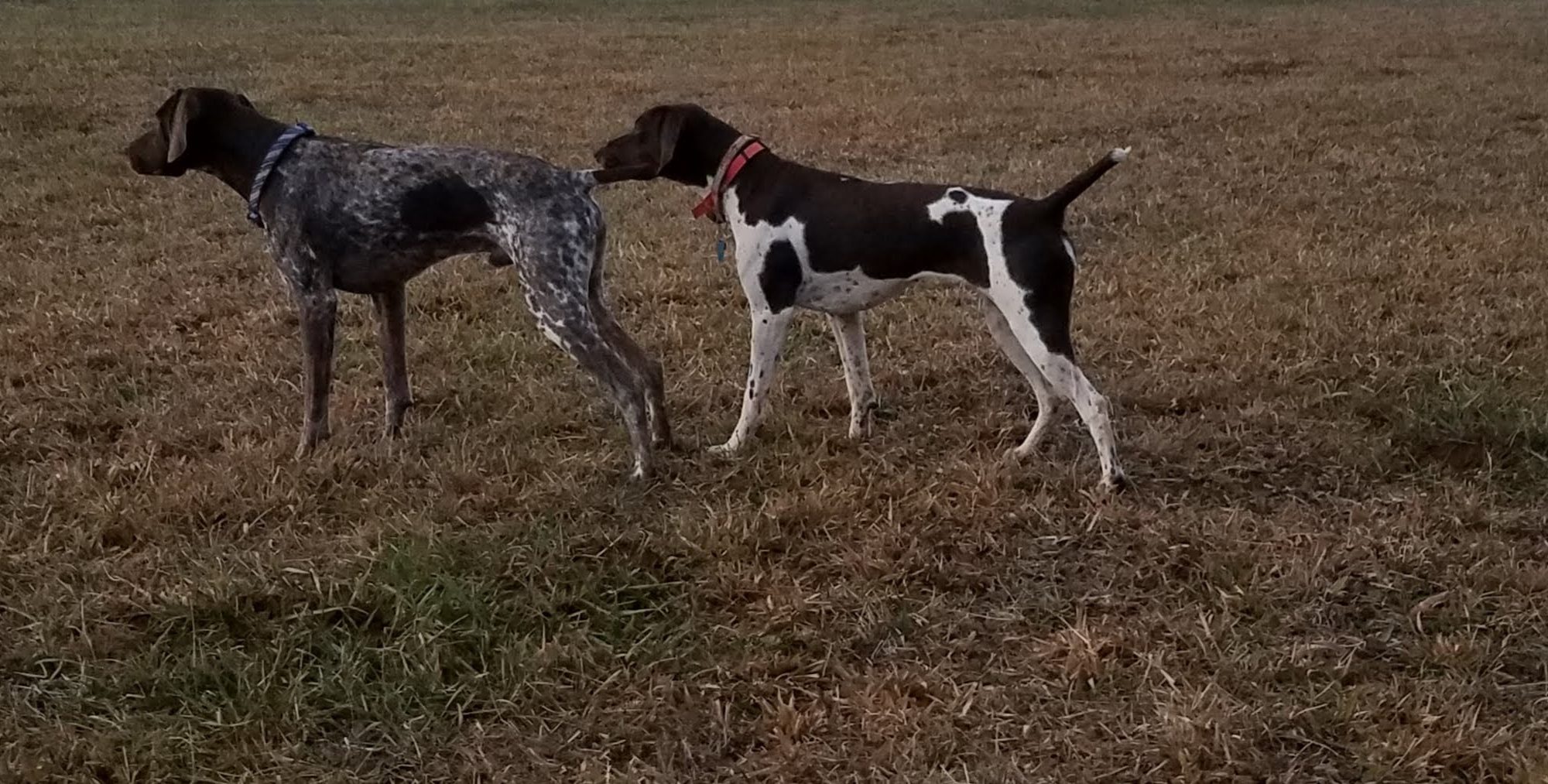A bone to the dog is not charity. Charity is the bone shared with the dog, when you are just as hungry as the dog.
Big Cedar Pointers:
We’re a small family breeder based in the farm country just north of Charlotte, NC. Our dogs are whelped, raised, and live with us in our home, situated on 12 wooded acres.
We believe in a natural approach to life, keeping things simple and in harmony with nature as much as possible.
We’re dog people. Well, technically, we’re animal people… but dogs are a BIG part of our lives. Engaging with our pups every day is our passion.
There’s a handful of breeds we truly admire, but we breed GSPs because we absolutely adore every facet about them (and there are many). Our goal is to produce excellent dogs–to pass along the friendship and life-changing experience of having a dedicated, enthusiastic, hard-working GSP as part of the family.
The Breed:
The German Shorthaired Pointer breed traces its lineage back centuries through Central Europe, France, Italy, Spain, and ultimately Germany where it developed into the quintessential Gun Dog we recognize today.
A versatile dog, the German Shorthaired Pointer or GSP, hunts, points & retrieves. Its determination to work any terrain, water and weather is matched only by their loyalty and dedication to please their owners.
A fast, lean medium size dog, you can’t fully appreciate a GSP until you see it charge through a wooded area with the grace of a gazelle and the resolve of a rhino, or point a bird in the high brush, like a living statue.
Breed Specifications:
Height: Male / 23-25 inches – Female / 21-23 inches
Weight: Male / 55-70 pounds – Female / 45-60 pounds
Coat: Short, low maintenance.
Tail: Docked to 40-50%
Colors: Learn all about GSP colors and patterns on our color explanation page. Liver, Liver Roan, Liver & White, Black, Black Roan, Black and White.
Nose Color: Black or Liver
Eye color: AKC preference Dark Brown.
Markings: Solid, Patched, Ticked, Patched & Ticked.
Life Expectancy: 10-12 years (though up to 15 is not uncommon)
AKC Disqualifications for Show:
- China or wall eyes (clear blue eyes flecked with a white or lighter blue).
- Flesh colored nose.
- Extreme overshot or undershot (jaw alignment).
- Unilateral or bilateral cryptorchid.
- Functional abnormality of eyelids or eyelashes.
- A dog with any area of black, red, orange, lemon, or tan, or a dog solid white.
Is a GSP the right breed for you?
Well, clearly, if you’re a hunter, yes.
For the non-hunters considering a GSP companion, here’s some of the basics:
- GSPs are high energy dogs that require significant activity and exercise. There are moments when they like to curl up on the couch and hog the covers on the bed, but the general word of the day for GSP is, “Go” or more accurately, “Go, Go, Go!” If you work them outside, they will be content to rest inside, with only a few outbursts of zoomies. On bad weather days when you’re too lazy to take them out, anchor down the furniture–the GSP storm is coming through.
- Intelligent and eager to please.
- They are good-natured and friendly.
- Commonly referred to as Velcro dogs. They like to be with their owners most of the time. You in the kitchen cooking dinner? Your GSP is there to help you with the recipe. You grab your keys to run an errand? Your GSP is already at the door waiting to go. You trying to put that piece of ikea furniture together? Your GSP is sitting right next to you with a tilted head, wondering why you’re so mad.
- Because of the strong bond with their owners GSPs can suffer from separation anxiety. This anxiety can lead to destructive behavior, excessive barking, eliminating etc. If you’re a one person home, where the dog needs to be kenneled for a full work-day, a GSP is probably not for you. And yes, if you have an outside kennel, they dig and fly.
- GSPs typically get along well with other dogs. And even other animals if you socialize them early. They do have a strong prey drive for the smaller critters, but are generally pretty good at understanding, they shouldn’t eat the cats and chickens.
- GSPs are also generally good with kids.
- They have webbed feet and are solid swimmers. Ours love trips to the ocean.
- When the dogs charge toward the front window barking, we know our Amazon delivery has arrived. While good watch dogs, GSPs are not aggressive with strangers, unless you count jumping on visitors and knocking them on their ass, or smashing them in the face with an unexpected kiss. UPS delivery men beware.
- On this last point, GSPs are a lot of dog. Even with obedience training, GSPs are like those super bouncy rubber balls–always in motion, always an explosion of energy waiting to go off.
- As the name suggests, GSPs have short coats. They do shed, but their fur is much smaller and finer than other breeds. Though difficult to pick off furniture and clothes, you can’t just grab it like a ball of long-haired fur, GSP shedding is generally less noticeable.
- While GSPs love their human owners, work to please them, and follow command well, there’s an old adage when it comes to hunting dogs… “Nose on, Ears off.” If a GSP catches a scent or spots a critter shooting into the night, they can take off on you. Despite you calling them back in your “serious” voice. For this reason, at least for the early years of their lives, they can’t be left alone off leash for any significant amount of time.
Health Concerns:
GSPs are generally strong, resilient, healthy dogs. However, like any pure breed, there are a few health concerns that may appear in the breed.
- Hip and elbow dysplasia. (abnormal formations of the joint sockets.)
- Eye conditions such as progressive retinal atrophy/cone degeneration. (progressive disease of the retina resulting in loss of vision in day light–“day blindness”)
- Certain heart diseases.
- Von Willebrand disease (blood disorder).
- Degenerative myelopathy(a late onset, progressive neurological disease similar Lou Gehrig’s disease in people.)
- Lupoid Dermatosis. ( a progressive skin condition that may advance to affect the spleen, lymph nodes, and kidneys.)

